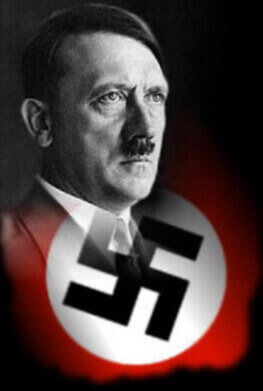The Human Body and the Body Politic, Chapter II:
Nationalism as a Struggle Against Death
| Nationalism is a fantasy about the body politic: one’s own body, projected outward. “Hitler is Germany, just as Germany is Hitler (Rudolf Hess):” The body of the individual equated with an entire nation. Hitler became a body politic.
Hitler believed that the German nation was in a state of “disintegration.” This was a claim he made repeatedly. He feared that Germany was falling apart. The idea that the nation was disintegrating meant that Hitler himself would disintegrate—unless radical action was taken. Nazism was a struggle against death: overcoming the force of disintegration acting within the body politic. Hitler relocated himself into the nation. His struggle (Mein Kampf) was a struggle against death: to be or not to be. Nazism constituted a rescue fantasy, pursued with self-righteous fanaticism: “We may be inhumane, but if we rescue Germany…we have performed the greatest dead in the world.” Best regards,Richard Koenigsberg, PhD Director, Library of Social Science |
|
||
Hitler conceived the Jew as a disease within the body politic. Germany’s disease was Hitler’s disease. He experienced the Jew as a body within his own body. What was this disease within Hitler’s body? Nothing more or less than the German nation. The Jew was the negative experience of this gigantic body bound to—within—Hitler’s body. What an enormous burden to have an entire nation contained within oneself! Hitler insisted that each and every German bind their body to the German body politic—to create an enormously powerful national organism. If Germans fused together like a single block of steel—this would create an indestructible body that no one could tear asunder. Nazism was devotion to the health of Germany. The life of the body politic was more significant than the bodies of individuals. Nazism was nationalism carried to the nth power. Reductio ad absurdum. Hitler revealed the dream of nationalism for what it is: A shared fantasy about a gigantic body. An entire body of territory is equated with one’s own body. Hitler—like many fanatic nationalists—believed that his nation was in a process of deterioration—had fallen into decline. Hitler’s mission was to restore Germany’s health—make her great again. Even as Hitler believed in the greatness of Germany, he imagined she was weak—disintegrating. Nazi ideology was a rescue fantasy seeking to restore Germany to her rightful place as a powerful nation—by removing from within the sources of her decline. Radical nationalism often takes the form of a moral crusade: violence in the name of virtue. Destruction is conceived as goodness: eliminate the causes of weakness to restore the nation’s health. To rescue one’s nation is to rescue oneself. Nationalism is a struggle of life against death. In the struggle to restore or rescue one’s body (politic), any and all actions are justified and justifiable: “We may be inhumane, but if we rescue Germany—we have performed the greatest deed in the world.” |
